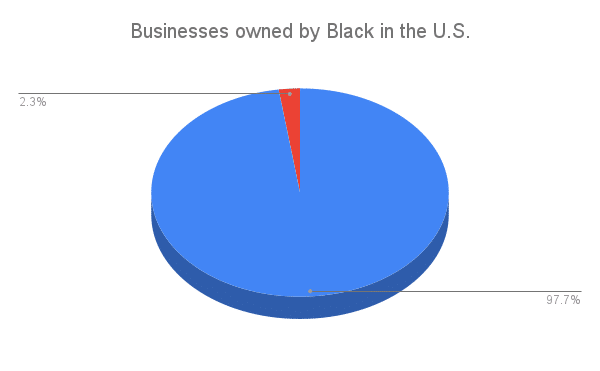Blockchain is emerging as a key tool in empowering Black entrepreneurs and addressing the diversity gap in the tech industry.
Over the years, the tech industry has struggled with a lack of diversity, especially in underrepresented communities such as Black and African Americans, as well as other minority groups.
While initiatives have been taken to address this issue, there is still a significant gap in representation, access to financing and opportunities for Black entrepreneurs.
This article explores how blockchain can address structural racism and the wealth gap and provide opportunities for Black-owned businesses and projects to thrive.
The challenges facing black entrepreneurs in technology
The lack of black representation in the tech sector goes beyond just meeting quotas. Only 2.3% of American businesses are owned by Black people, even though Black people make up almost 14% of the population. Black-owned businesses also have a higher failure rate, with 8 out of 10 businesses failing within the first 18 months.

Black-Owned Businesses in the US | Source: crypto.nieuws
The challenges Black entrepreneurs face in the tech sector stem from multiple levels of the startup ecosystem. Furthermore, they are often rooted in systemic barriers and biases that limit access to resources and opportunities.
For example, black people are underrepresented in STEM courses, making it harder to break into the technology industry. Venture capital firms are also largely owned and operated by non-Black individuals, which limits the amount of funding available to Black-owned businesses.
Startups are also affected by discrimination, as Black entrepreneurs struggle to access high-growth, early-stage projects without meeting the asset requirements of an accredited investor.
You might also like: Empowering women in crypto: challenges and progress in 2023
Blockchain as an equalizer
Yet there are significant opportunities for growth and innovation in this sector.
Blockchain technology and crypto assets will transform everything from financial services and supply chains to government services, making it possible to tackle inequality at its roots.
The reason it is so revolutionary is that blockchain removes many of the traditional barriers to acquiring, storing and transferring wealth. It is permissionless, meaning consumers do not have to access crypto assets through a central authority.
Blockchain gives virtually anyone access to high-growth, early-stage projects without meeting the asset requirements of an accredited investor.
While the crypto industry has historically had a gender imbalance, recent trends indicate a shift toward greater gender diversity. Gemini’s State of Crypto 2022 report shows that globally, 47% of those interested in buying cryptocurrency for the first time within a year are women. In developing countries, women’s participation in crypto ownership is particularly high, with women making up more than half of crypto owners in Israel (51%), Indonesia (51%) and Nigeria (50%).
On the other hand, in more developed regions, the share of women currently owning cryptocurrency is lower. This includes the United States (32%), Europe (33%) and Australia (27%), where only about a third of crypto owners are women.
You might also like: Cryptocurrency adoption among women is increasing
DAOs and crypto companies are working to close the gap
Technology accelerators such as Smarter in the City, Black Founders and Blacks in Technology provide workspace, collaboration opportunities and advocacy for African American entrepreneurs.
Nearly 40% of African Americans under 40 own cryptocurrency, compared to 29% of whites https://t.co/xMxMXIPWqJ
— The Economist (@TheEconomist) May 21, 2022
Decentralized autonomous organizations (DAOs), defined simply as blockchain communities with a shared bank account, can go one step further. Black-owned blockchain companies, projects, and DAOs are helping with both access and financing.
Because no centralized leadership leads DAOs, they are less likely to exclude people based on identity factors such as age, gender, or race. And this lack of discrimination goes beyond DAOs and concerns the blockchain as a whole.
An example is a non-fungible token (NFT) project called “Long Neck Ladies”. This is an NFT project created by a 13-year-old black girl that has generated millions in revenue.

Long Neck Ladies NFT | Source: nft-stats.com
Future prospects
In conclusion, the lack of representation of Black entrepreneurs in the technology industry is a persistent problem that must be addressed to promote diversity, equality and inclusivity.
Blockchain offers a promising solution by empowering underrepresented communities through decentralized finance, DAOs, and other crypto-native solutions.
It is essential to ensure that diversity and inclusion are at the forefront of technology entrepreneurship to create a truly just and inclusive world.
Read more: Research shows that women and Gen Z are leading crypto trading in Singapore

